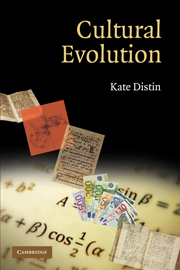Book contents
- Frontmatter
- Contents
- Cultural Evolution
- 1 Introduction
- PART I THE INHERITANCE OF CULTURAL INFORMATION
- 2 What Is Information?
- 3 How Is Information Inherited?
- PART II THE INHERITANCE OF CULTURAL INFORMATION
- PART III THE INHERITANCE OF CULTURAL INFORMATION
- PART IV THE RECEIVERS OF CULTURAL INFORMATION
- PART V THE EXPRESSION OF CULTURAL INFORMATION
- 14 Conclusion
- Appendix
- Acknowledgements
- Bibliography
- Index
- Frontmatter
- Contents
- Cultural Evolution
- 1 Introduction
- PART I THE INHERITANCE OF CULTURAL INFORMATION
- 2 What Is Information?
- 3 How Is Information Inherited?
- PART II THE INHERITANCE OF CULTURAL INFORMATION
- PART III THE INHERITANCE OF CULTURAL INFORMATION
- PART IV THE RECEIVERS OF CULTURAL INFORMATION
- PART V THE EXPRESSION OF CULTURAL INFORMATION
- 14 Conclusion
- Appendix
- Acknowledgements
- Bibliography
- Index
Summary
At the heart of my theory of cultural evolution is the claim that human culture, as much as our nature, is the product of evolving information. Culture is the behavioural and artefactual product of interactions between humans and cultural information, and cultural evolution is the product of heritable variations in that information. This means that our understanding of cultural evolution must be founded on an understanding of heritable information.
Informational language provides biologists with a handy conceptual tool, particularly when thinking about genes: it is common to hear talk of genetic information being transcribed, translated, edited, expressed and transmitted from one generation to the next. It is a little surprising, then, to find that there is no clear consensus about what information is, exactly. If evolution can really be understood as the product of heritable information, then there seems to be a major conceptual omission at the heart of our understanding of evolutionary theory.
In this chapter and the next, I develop a theory of heritable information that is broad enough to encompass biological as well as cultural information but detailed enough to provide answers to individual questions in both fields. It enables us to distinguish, for example, between inheritance mechanisms that can contribute to long-term evolution and those that cannot. It helps to resolve debates about whether genes carry a causally special type of information in nature, and why human culture is so uniquely complex and extensive.
- Type
- Chapter
- Information
- Cultural Evolution , pp. 11 - 24Publisher: Cambridge University PressPrint publication year: 2010



